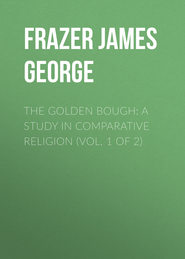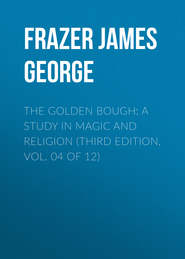По всем вопросам обращайтесь на: info@litportal.ru
(©) 2003-2024.
✖
The Golden Bough: A Study in Magic and Religion (Third Edition, Vol. 09 of 12)
Настройки чтения
Размер шрифта
Высота строк
Поля
925
See above, p. 392 (#x_28_i1).
926
[The extreme improbability involved in the suggested transference of the date of the Crucifixion is rightly emphasized by my colleague and friend Professor C. F. Lehmann-Haupt in some observations and criticisms with which he has favoured me. He writes: “I regard it as out of the question that ‘Christian tradition shifted the date of the Crucifixion by a month.’ You yourself regard it as improbable; but in my opinion it is impossible. All that we hear of the Passion is only explicable by the Passover festival and by the circumstance that at that time every believing Jew had to make a pilgrimage to Jerusalem. Without the background of the festival all that we know of the Crucifixion and of what led up to it is totally unintelligible.”]
927
Esther iii. 7.
928
Tacitus, Hist. iii. 24 sq., compared with ii. 74.
929
Luke xxiii. 11.
930
Matthew xxvii. 37; Mark xv. 26; Luke xxiii. 38; John xix. 19.
931
Matthew xxvii. 15-26; Mark xv. 6-15; Luke xxiii. 16-25; John xviii. 38-40.
932
Philo Judaeus, Adversus Flaccum, vol. ii. pp. 520-523 ed. Th. Mangey (London, 1742). The first to call attention to this passage was Mr. P. Wendland (“Jesus als Saturnalien-König,” Hermes, xxxiii. (1898) pp. 175 sq.). [Mar-na, “Our Lord,” was the title of a Philistine deity worshipped at Gaza and elsewhere. See C. P. Tiele, Geschichte der Religion im Altertum (Gotha, 1896-1903), i. 258. Compare Hebrew and English Lexicon, edited by F. Brown, S. R. Driver, and Ch. A. Briggs (Oxford, 1906), p. 1101.]
933
Matthew xxi. 1-13; Mark xi. 1-17; Luke xix. 28-46; John xii. 12-15. [As to the license accorded to temporary kings, see The Dying God, pp. 56 sq., 148 sqq.]
934
[The Dying God, pp. 166 sqq.]
935
[In favour of the theory in the text, which supposes that in the tragic drama of the crucifixion Jesus and Barabbas played parts which were the complements, if not the duplicates, of each other, it might, as M. Salomon Reinach has pointed out, be alleged that in the Armenian and old Syriac versions of Matthew xxvii. 16 and 17, as well as in some Greek cursive manuscripts, the name of the prisoner whom Pilate proposed to release is given as Jesus Barabbas, a reading which was also known to Origen and was not absolutely rejected by him. See Encyclopaedia Biblica (London, 1899-1903), s. v. “Barabbas,” vol. i. col. 477; Evangelion da-Mepharreshe, edited by F. C. Burkitt (Cambridge, 1904), i. 165, ii. 277 sq. In the latter passage Prof. Burkitt argues that Jesus Barabbas was probably the original reading in the Greek text, though the name Jesus is omitted in nearly all our existing manuscripts. Compare S. Reinach, “Le roi supplicié,” Cultes, Mythes, et Religions, i. (Paris, 1905) pp. 339 sq.]
936
Pliny, Epist. x. 96. The province which Pliny governed was known officially as Bithynia and Pontus, and extended from the river Rhyndacos on the west to beyond Amisus on the east. See Professor [Sir] W. M. Ramsay, The Church in the Roman Empire (London, 1893), p. 224. Professor Ramsay is of opinion “that the description of the great power acquired by the new religion in the province applies to Eastern Pontus at least.” The chief religious centre of this district appears to have been the great sanctuary of Anaitis or Semiramis at Zela, to which I have already had occasion to call the reader's attention. Strabo tells us (xii. 3. 37) that all the people of Pontus took their most solemn oaths at this shrine. In the same district there was another very popular sanctuary of a similar type at Comana, where the worship of a native goddess called Ma was carried on by a host of sacred harlots and by a high priest, who wore a diadem and was second only to the king in rank. At the festivals of the goddess crowds of men and women flocked into Comana from all the region round about, from the country as well as from the cities. The luxury and debauchery of this holy town suggest to Strabo a comparison with the famous or rather infamous Corinth. See Strabo, xii. 3. 32 and 36, compared with xii. 2. 3. Such were some of the hot-beds in which the seeds of Christianity first struck root.
See above, p. 392 (#x_28_i1).
926
[The extreme improbability involved in the suggested transference of the date of the Crucifixion is rightly emphasized by my colleague and friend Professor C. F. Lehmann-Haupt in some observations and criticisms with which he has favoured me. He writes: “I regard it as out of the question that ‘Christian tradition shifted the date of the Crucifixion by a month.’ You yourself regard it as improbable; but in my opinion it is impossible. All that we hear of the Passion is only explicable by the Passover festival and by the circumstance that at that time every believing Jew had to make a pilgrimage to Jerusalem. Without the background of the festival all that we know of the Crucifixion and of what led up to it is totally unintelligible.”]
927
Esther iii. 7.
928
Tacitus, Hist. iii. 24 sq., compared with ii. 74.
929
Luke xxiii. 11.
930
Matthew xxvii. 37; Mark xv. 26; Luke xxiii. 38; John xix. 19.
931
Matthew xxvii. 15-26; Mark xv. 6-15; Luke xxiii. 16-25; John xviii. 38-40.
932
Philo Judaeus, Adversus Flaccum, vol. ii. pp. 520-523 ed. Th. Mangey (London, 1742). The first to call attention to this passage was Mr. P. Wendland (“Jesus als Saturnalien-König,” Hermes, xxxiii. (1898) pp. 175 sq.). [Mar-na, “Our Lord,” was the title of a Philistine deity worshipped at Gaza and elsewhere. See C. P. Tiele, Geschichte der Religion im Altertum (Gotha, 1896-1903), i. 258. Compare Hebrew and English Lexicon, edited by F. Brown, S. R. Driver, and Ch. A. Briggs (Oxford, 1906), p. 1101.]
933
Matthew xxi. 1-13; Mark xi. 1-17; Luke xix. 28-46; John xii. 12-15. [As to the license accorded to temporary kings, see The Dying God, pp. 56 sq., 148 sqq.]
934
[The Dying God, pp. 166 sqq.]
935
[In favour of the theory in the text, which supposes that in the tragic drama of the crucifixion Jesus and Barabbas played parts which were the complements, if not the duplicates, of each other, it might, as M. Salomon Reinach has pointed out, be alleged that in the Armenian and old Syriac versions of Matthew xxvii. 16 and 17, as well as in some Greek cursive manuscripts, the name of the prisoner whom Pilate proposed to release is given as Jesus Barabbas, a reading which was also known to Origen and was not absolutely rejected by him. See Encyclopaedia Biblica (London, 1899-1903), s. v. “Barabbas,” vol. i. col. 477; Evangelion da-Mepharreshe, edited by F. C. Burkitt (Cambridge, 1904), i. 165, ii. 277 sq. In the latter passage Prof. Burkitt argues that Jesus Barabbas was probably the original reading in the Greek text, though the name Jesus is omitted in nearly all our existing manuscripts. Compare S. Reinach, “Le roi supplicié,” Cultes, Mythes, et Religions, i. (Paris, 1905) pp. 339 sq.]
936
Pliny, Epist. x. 96. The province which Pliny governed was known officially as Bithynia and Pontus, and extended from the river Rhyndacos on the west to beyond Amisus on the east. See Professor [Sir] W. M. Ramsay, The Church in the Roman Empire (London, 1893), p. 224. Professor Ramsay is of opinion “that the description of the great power acquired by the new religion in the province applies to Eastern Pontus at least.” The chief religious centre of this district appears to have been the great sanctuary of Anaitis or Semiramis at Zela, to which I have already had occasion to call the reader's attention. Strabo tells us (xii. 3. 37) that all the people of Pontus took their most solemn oaths at this shrine. In the same district there was another very popular sanctuary of a similar type at Comana, where the worship of a native goddess called Ma was carried on by a host of sacred harlots and by a high priest, who wore a diadem and was second only to the king in rank. At the festivals of the goddess crowds of men and women flocked into Comana from all the region round about, from the country as well as from the cities. The luxury and debauchery of this holy town suggest to Strabo a comparison with the famous or rather infamous Corinth. See Strabo, xii. 3. 32 and 36, compared with xii. 2. 3. Such were some of the hot-beds in which the seeds of Christianity first struck root.











